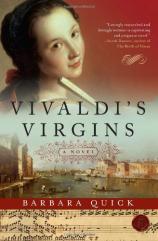Vivaldi's Virgins
Review
Vivaldi's Virgins
Literary critics are notorious for finding hidden meanings in
the most transparent works of literature, so I’ll be the
first to admit that I might be off base here. But I think that
there is at least an unintentional message in VIVALDI'S VIRGINS: if
you have enough talent and discipline, you can get away with a
whole lot.
If you have talent, you’re able to distinguish yourself from
the common lot, and that’s a good start. If you have enough
of it, some people will look up to you while others will be jealous
of you, and you can find ways to use this to your advantage.
You can be eccentric, or more than that, if you have talent.
Then there’s discipline, which is the ability to outwork
others, harness your talent and make it work for you. Discipline by
itself is worth cultivating on its own merits, of course, but
discipline accompanied by talent can work wonders. (Talent without
discipline just makes people envious of you, and that’s not
going to help you out much.) Having both is a rare combination;
most people recognize that and want to help you. And it’s so
rare that --- generally speaking --- people are willing to forgive
you when you go astray, which means you can get away with a lot of
things that most others can’t.
The narrator of VIVALDI'S VIRGINS is Anna Maria dal Violin, and her
last name is not an accident. Anna Maria, a real person who lived
in Venice in the early 18th century, was an orphan whose home was a
training ground for musicians. She and her cohorts were brought up
as musicians, playing sacred music for the souls of the dead and
the enlightenment of the living. As the novel opens, Anna Maria is
still a child, though her skill at the violin has earned her a
place as the student of Antonio Vivaldi.
For those who don’t know a great deal of classical music,
Vivaldi’s name is little more than half of a free-association
exercise --- you say “Vivaldi,” I say “The Four
Seasons.” But Vivaldi is more than the answer to a trivia
question for Anna Maria; he is her teacher, the “Red
Priest” who is trusted to teach music to the virgin girls of
the Ospedale della Pieta, one of the only men in their cloistered
world.
Anna Maria (who tells the story both from her perspective as an
adult and through the letters she wrote as a child) is talented and
works hard at her craft. But she desires above all else to
experience that which she does not know --- the love of her
long-lost mother, the excitement of Venice’s Carnival, the
temptation of the opera, and the balls, silks and masks of Venetian
society. This leads her, time and again, to sneak out of the
foundling’s home and into the larger world --- and because
talent and discipline won’t get you out of everything each
and every time, it leads her into trouble as well.
If the story sounds somewhat slight, the talent behind it is
formidable. Author Barbara Quick brings a sharp, artistic eye to
the proceedings, describing the subtle details of Venetian fashion
and society down to the last pearl on the hem of the dress to the
last drops of blood in the aristocratic bloodline. Quick is
animated by a deep love of and appreciation for the lost past of
Venice and the city’s rich romantic heritage. It is her
talent in bringing the insular world of the Ospedale della Pieta
alive that keeps the story going, and it is her disciplined
historic research that keeps the reader enthralled. With that
combination you can get away with a good deal, but you can also
produce a lot --- in this case, a fine novel like VIVALDI'S
VIRGINS.
Reviewed by Curtis Edmonds, who writes the "Northbound" blog at http://www.txreviews.com/blog. on January 24, 2011
Vivaldi's Virgins
- Publication Date: August 1, 2008
- Genres: Fiction, Historical Fiction
- Paperback: 304 pages
- Publisher: Harper Paperbacks
- ISBN-10: 0060890533
- ISBN-13: 9780060890537




